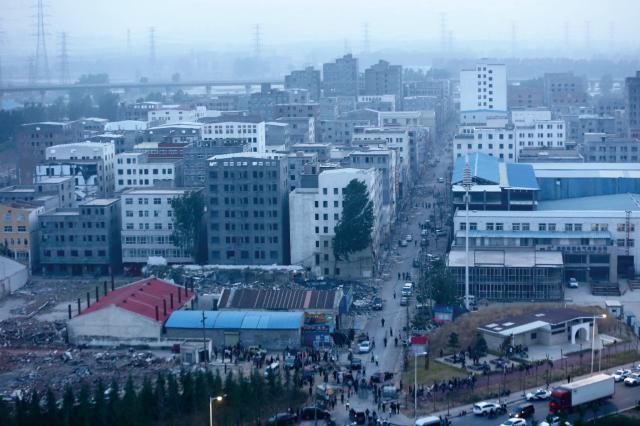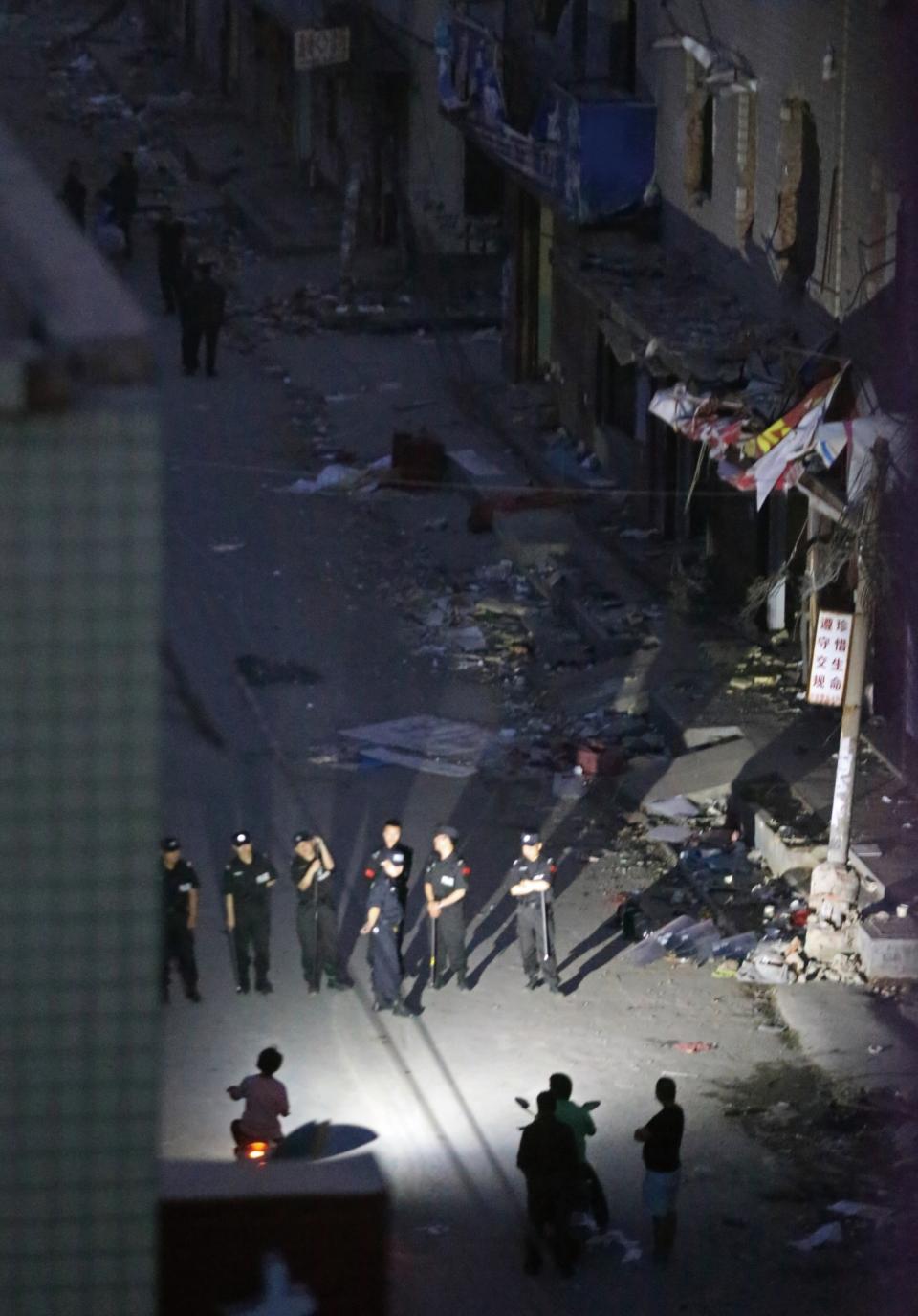The deaths of four people during an alleged forced demolition reflect how tensions and distrust between the local government and the public have far from dissipated
On May 10, 2016, during an alleged forced demolition, Fan Huapei, a 36-year-old warehouse keeper in Xuegang Village, which lies within the city limits of Zhengzhou, Henan Province, killed three people and seriously injured another before being fatally shot by police.
Xuegang Village is located in the northern part of the city of Zhengzhou, and is home to 456 households who live off of vegetable farming.
Over the past two years, demolitions in nearby villages have driven some 50,000 displaced people to Xuegang, and locals have constructed rental accommodations to meet demand.
According to local government plans, however, Xuegang Village is the last on a list of communities slated for demolition in a massive urban renewal program. The incidents surrounding Fan’s death, however, have led to a public outcry over forced demolition, an issue many were starting to believe had been left behind with China’s breakneck boom years.
Demolition
Starting from the end of 2013, demolitions began in Laoyachen Village, a short distance from Xuegang. Laoyachen was Zhengzhou’s largest village, with a settled population of 16,000 augmented by an estimated 300,000 migrants. Laoyachen’s close proximity made relocation to Xuegang the best option for those displaced by the demolition of their homes.
Monthly rent costs in Xuegang climbed to 350 yuan (US$53) for a single room in one of the village’s three-story residential buildings, a high amount for rural areas. Demand led newcomers to push local residents to construct taller apartment buildings to accommodate them.
According to local planning regulations, however, it is illegal to build private housing more than three stories tall in Xuegang. The allure of rising rents and a windfall of compensation paid to those whose homes had been demolished proved irresistible to locals, despite warnings from the Zhengzhou government that there would be a crackdown on illegal construction starting January 2013.
The situation couldn’t last. In late January 2016, village heads began to post demolition notices in Xuegang Village, resulting in resistance from villagers who demanded to see official government approval for the plans, demands ignored by their leaders. All they were told was that the entire village would be demolished in two months.
Fan Huapei, a college graduate, had borrowed 700,000 (US$106,380) from friends and relatives to construct a seven-story residential building in 2014. When the demolition notices went up, the local government only offered him 500,000 yuan (US$76,100) in compensation, far from enough for him to pay off his debts.
Liu Lan, a Xuegang local and a classmate of Fan’s for eight years, told NewsChina that the construction costs for residential properties were at least 600 yuan (US$91) per square meter.
“In the past, some villagers had only received the first installment of compensation, with no further payments,” Liu told our reporter.
“What’s more, we are not informed of where we are to relocate, which makes all of us feel insecure. This is also an obvious violation of the central government’s requirement of ‘resettlement before demolition.’” In April, most of Xuegang’s population had relocated, with only a dozen or so households holding out, including Fan’s. The demolition office frequently cut off electricity and water supplies in order to force the remaining villagers from their homes. When his water was cut off, Fan walked to the local elementary school to obtain it. By that point, most of his tenants had left, depriving Fan of his main source of income.
Meanwhile, more than 160 households in the neighboring Laoyachen Village had been forced from their homes, causing Fan and his fellow holdouts further panic.
Tragedy
On May 10, Fan’s father was discharged from the hospital where he had been undergoing treatment following a heart attack that Liu Lan told NewsChina had been triggered a year previously because of the demolitions. Fan’s father’s hospital bills, which added to his mounting debts, coupled with the diminishing rents, left Fan with few options.
At 4 PM, Fan left his home with a knife in his hand. Seeing a tow truck driver conducting repairs near his home, he mistakenly assumed the man was trying to cut off his electricity. A quarrel ensued, which ended with Fan stabbing the driver to death before proceeding to the local demolition office, where he killed the office’s deputy director, Chen Shan.
On his way home, he also stabbed a father and son to death. The pair were collecting unwanted air conditioners for recycling, but Fan assumed they were planning to steal his home’s air conditioners.
At 5:06 PM, Fan posted a message on his WeChat account, saying: “I have killed... I cannot live anymore.” Fan was later gunned down during a confrontation after officers fired a warning shot. According to a police press release, Fan, drunk, had been driving dangerously and had brandished a knife, threatening to kill again. Footage later emerged showing Fan’s family members pleading with police not to shoot and attempting to persuade Fan to give himself up before they were dragged away by officers.
On May 11, a funeral held at Fan’s home by his relatives was attended by over 1,000 villagers. More than 150 of them joined others affected by the case to make donations totaling 25,000 yuan (US$3,807) to help Fan’s family, in particular his seven-year-old daughter. Several hours later, however, the crowd of well-wishers was dispersed by police.
Hu Xingdou, a professor at the Beijing Institute of Technology, told the Global Times that Fan’s reaction reflects local people’s sustained dissatisfaction with forced demolitions.
“For a long time, China lacked effective supervision of forced demolition.
People whose properties were demolished had to fight back violently and their acts came to be regarded as heroic,” said Hu, adding that Fan’s case shows that such conflicts are deep-rooted, and that the government should work harder to resolve these dangerous social divisions.

A bird’s eye view of Xuegang Village, where forced relocations have angered residents, May 10, 2016
Challenges
According to Gao Guihua, a city planning expert who has researched urban renewal in Zhengzhou for the past 10 years, Fan’s case was far from exceptional.
“In satellite photos, Zhengzhou looks like an earthquake has hit it,” she told NewsChina, adding that there are currently several subway lines and highways under construction simultaneously, resulting in the wholesale demolition of dozens of villages.
She said that starting in 2012, many displaced rural residents were not compensated sufficiently or in a timely fashion during village renovations and demolitions, leading many people to distrust the government.
According to Zhang Huaqiang, a resident of Laoyachen Village, households that agreed to move were promised 7,200 yuan (US$1,096) annually paid to each family member over the following three years on top of an additional annual 5,000 yuan (US$761) in living expenses.
The government, however, did not provide them with new homes.
In December 2013, demolitions began in Laoyachen Village, but were disrupted by angry residents. One day in December 2014, a demolition team made up of hundreds of people marched to the village behind several bulldozers. They were confronted by thousands of villagers, and a near-riot ensued, resulting in dozens of injuries.
“Because the villagers vastly outnumbered the demolition team, they were not at a disadvantage,” Zhang told NewsChina. After seeing off the interlopers, Laoyachen’s villagers then blocked the main road to the village with old sofas and bonfires, effectively paralyzing local transportation for three days. A series of street protests followed in 2015, and the authorities finally presented the community with a revised compensation plan. To this day, however, there are still more than 100 households in Yaoyachen that have refused to relocate.
Gao Guihua told our reporter that many households in rural China made a fortune overnight by cashing in on their landholdings, adding that “their desire for wealth is sometimes unlimited.” On April 28, Huang Fang, Party chief of Zhengzhou’s Huiji District, emphasized during a demolition mobilization meeting that government agencies would work together to introduce tougher measures to hit their targets, ominously vowing to leave no household standing.
Gao said the death of Fan Huapei, however, has further held up demolitions in the city, and soured the already acrimonious relationship between the authorities and local residents.

 Old Version
Old Version
